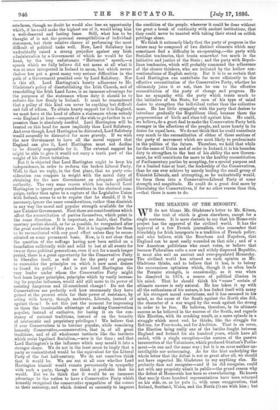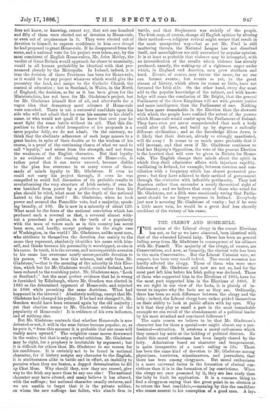THE MEANING OF THE MINORITY.
NvE do not blame Mr. Gladstone's letter to Mr. Kitson, the text of which is given elsewhere, except for a single sentence. It is mere rhetoric to say that his Home-rule project has the approval of the civilised world. It has the approval of a few French journalists, who remember that friendship for Irish insurgents is a tradition of French policy, and who believe, with the Bourbons and Napoleon, that England can be most easily wounded on that side ; and of a few American politicians who court votes, or believe that because Federalism snits a new and widely dispersed Republic, it must also suit an ancient and over-populated Monarchy. The civilised world has uttered no such opinion as Mr. Gladstone thinks, and to believe that it has, is to betray the unconscious optimism which, though it so often lends the Premier strength, is occasionally, as it was when he dissolved in 1874, a source of political illusion in his mind. That he should think his " cause " certain of .ultimate success is only naturaL He has taken it up with all the enthusiasm of his nature, it has linked itself with many of his strongest moral convictions, and it has assumed in his mind, as the cause of the South against the North also did, the character of a war waged by the weak against the strong in order to be free. He believes, therefore, in its ultimate success as he believed in the success of the South, and regards this Election, with its crushing result, as a mere episode in a straggle which must end, he thinks, like the struggle for Reform, for Free-trade, and for Abolition. That is an error, the Election being really one of the battles fought between England and Ireland for six hundred years, which have all ended, with a single exception—the success of the passive insurrection of the Volunteers, which produced Grattan's Parlia- ment—in one and the same way ; but it is an error neither un- intelligible nor unbecoming. As for the hint underlying the whole letter that the defeat is not so great after all, we should not have expected Mr. Gladstone to say anything else. He probably does not recognise—and if he did recognise, could not with any propriety admit in public—the grand reason why the defeat of Home-rule has been so overwhelming. He knows that neatly three hundred representatives have been returned on his side, or, as he puts it, with some exaggeration, that Ireland, Scotland, Wales, and the North (?) are with him ; but
does not know, or knowing, cannot say, that not one hundred and fifty of them were elected out of devotion to Home-rule, or even out of acquiescence in it. They were elected out of devotion to himself, to express confidence in him even though he had proposed to grant Home-rule. If he disappeared from the
scene, and a national vote for his project were taken, say, by the most consistent of English Home-rulers, Mr. John Morley, the verdict of Great Britain would approach far closer to unanimity, would in all human probability be identical with that pro- nounced already by the Metropolis. In Ireland, indeed, it is true the decision of three Provinces has been for Home-rule, as it would be for any project whatever which would give the peasantry the land, and assign to the Catholic Church the control of education ; but in Scotland, in Wales, in the North of England, the decision, so far as it has been given for the Ministerialists, has not been for Mr. Gladstone's project, but for Mr. Gladstone himself first of all, and afterwards for a vague idea that democracy must advance if Home-rule were conceded. There is not a successful candidate upon his side who will not admit that he owes his success to his chief's name, or who would not quail if he knew that next year he must fight the same battle without its aid. That this dis- position to follow a chief irrespective of his proposals is a mere popular folly, we do not admit. On the contrary, we think that the obstinate adherence of such large masses to a great leader, in spite of their doubts as to the wisdom of his course, is a proof of the continuing charm of what we used to call "loyalty," and arises from the strength, and not from the weakness, of the English character. But that loyalty is no evidence of the coming success of Home-rule, is rather proof that it can never succeed, because dislike to the plan has overcome in so many scores of thou- sands of minds loyalty to Mr. Gladstone. If even he could not carry hie project through, if even he was compelled to avoid full discussion of its probable results in revolutionising the very structure of Irish society, if even he was banished from power by a plebiscitunz rather than his plan should be tried, what must be the depth of the national hatred to the plan itself ? Mr. Gladstone, when he took power and secured the Parnellite vote, had a majority, speak- ing broadly, of 160. He is now in a minority of about 120. What must be the force of the national conviction which has produced such a reversal as that, a reversal almost with- out a precedent in politics, in the teeth of a popularity with the mass of voters such as in this country has never been seen, and hardly, except perhaps in the single case of Washington, in the world ? Mr. Gladstone, unlike most men, who attribute to themselves the devotion due mainly to the cause they represent, absolutely identifies his cause with him- self, and thinks because his personality is worshipped, so also is his cause. In truth, it is the reverse, and unconquerable aversion to his cause has overcome nearly unconquerable devotion to his person. "We can bear this scheme, but only from Mr. Gladstone,"—that is the meaning of the minority in this Elec- tion, which but for Mr. Gladstone would, outside Ireland, have been reduced to the vanishing point. Mr. Gladstone says, "Look at Scotland ;" but the most perfect evidence that he is wrong is furnished by Edinburgh, where Mr. Goschen was elected in 1885 as the determined opponent of Home-rule, and rejected in 1886 while preaching the same doctrines. What had happened in the interval ? Absolutely nothing, except that Mr. Gladstone had changed his policy. If he had not changed it, Mr. Goschen would have been returned again by the old majority ; yet that election seems to Mr. Gladstone evidence of the popularity of Home-rule! It is evidence of his own influence, and of nothing else.
But Mr. Gladstone contends that whether Home-rule is now defeated or not, it will in the near future become popular, or, as he puts it, "from this moment it is probable that our cause will visibly move upward." The weightier cause moves downward in the scales ; but that is only a verbal criticism. Mr. Gladstone may be right, for a prophecy is irrefutable by argument ; but it is difficult for others than Mr. Gladstone to see reason for his confidence. It is certainly not to be found in national character, for if history assigns any character to the English, it is stubbornness alike in battle and in effort, an inability to perceive when they are beaten, a dogged determination to fill up Chat Moss. Why should they, now they are roused, give way to the Irish any more than to any one else ? The national character may have altered, and many believe it has altered, with the suffrage ; but national character usually endures, and we are unable to forget that it is the private soldier, on whom the new suffrage.. has fallen, who stands firm in
battle, and that Stephenson was strictly of the peeple. The Irish may, of course, change all English opinion by altering their methods—a religious revival might secure that result in the most unexpected way—but as yet Mr. Ford is still muttering threats, the National League has not dissolved itself, and moonlighters are still uncrushed by popular opinion. It is at least as probable that violence may be attempted, with an intensification of the results which violence has already produced, namely, the waking-up of a righteous anger under which, in England and America, men grow stubborn and hard. Events, of course, may favour the cause, for no one can foresee events ; but events as yet, in the great stream of history, which alters its course so little, have npt favoured the Irish aide. On the other band, every day meat add to the popular knowledge of the subject, and with know- ledge will come the conclusion of Mr. Bright, that the general Parliament of the three Kingdoms will act with greater justice and more intelligence than the Parliament of one. Nothing has been more remarkable in the Election than the slowness with which the people have realised the extent of the powers which Home-rule would confer upon the Parliament of Ireland. They have even yet never comprehended that such a body could alter all laws, and build up by degrees a radically different civilisation ; and as the knowledge filters down, is it likely that their distrust, already so strongly manifested, will die away ? It seems to us much more probable that it will increase, and that even if Mr. Gladstone continues to lead her Majesty's Opposition, the vote of the present Election is the heaviest that will ever be given in Britain for Home- rule. The English change their minds about the spirit in which they shall administer affairs with injurious rapidity, vacillating in Ireland, for example, between coercion and con- ciliation with a frequency which has almost prevented pro- gress ; but they have adhered to their method of government through the centuries with inflexible pertinacity. They lost America rather than surrender a nearly theoretical right of Parliament ; and we believe that even of those who voted for Mr. Gladstone, not a fifth were consciously voting that Parlia- ment should be no longer supreme in Ireland. Everybody just now is accusing Mr. Gladstone of vanity ; but if he were a little more vain, he would be a great deal less cheerily confident of the victory of his cause.



































 Previous page
Previous page